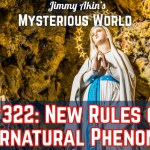
 Jimmy Akin's Mysterious World
Jimmy Akin's Mysterious World New Rules for Evaluating Supernatural Phenomena (Apparitions, Visions, Eucharistic Miracles, Catholic, Vatican, Dicastery for the Doctrine of the Faith)
Jul 26, 2024
Jimmy Akin, an expert in Catholic doctrine, and Dom Bettinelli, a commentator on faith issues, discuss the Vatican's new rules for evaluating supernatural phenomena. They explore the implications of these guidelines on historical and ongoing cases. The duo examines how bishops must discern between genuine experiences and misleading claims while considering the moral complexities involved. They also touch on how these rules could change the Church’s approach to extraordinary events, including UFOs, bringing a fresh perspective to the intersection of faith and the mysterious.
Chapters
Transcript
Episode notes
1 2 3 4 5 6 7 8 9 10 11 12
Intro
00:00 • 4min
Understanding Public and Private Revelation in Christian Faith
03:40 • 2min
Exploring the Intersection of Holiness and Extraordinary Phenomena
06:05 • 3min
Evaluating Supernatural Phenomena
08:39 • 13min
Discerning the Supernatural: The Bishop's Role
21:21 • 19min
Investigating Supernatural Claims: Ecclesiastical Procedures and Patron Appreciation
40:28 • 4min
Bishop's Duty: Evaluating Supernatural Claims
44:19 • 11min
Civil Authority and Church Governance in the Face of Supernatural Claims
55:22 • 2min
Evaluating Supernatural Claims
56:54 • 12min
Investigating Supernatural Claims
01:08:34 • 9min
Evaluating Supernatural Phenomena in the Catholic Church
01:17:11 • 21min
Evaluating Supernatural Phenomena: Vatican Norms and UFOs
01:38:09 • 6min


 The Vatican has released new rules for evaluating reports of supernatural phenomena. Jimmy Akin and Dom Bettinelli conclude their two-part discussion by looking at the rules themselves; the possible categories; and how the investigations are to be carried out.
The Vatican has released new rules for evaluating reports of supernatural phenomena. Jimmy Akin and Dom Bettinelli conclude their two-part discussion by looking at the rules themselves; the possible categories; and how the investigations are to be carried out.